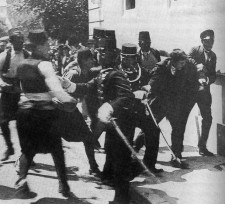Park Historian to Give Talk on 100th Anniversary of World War One
Posted June 16, 2014 at 5:32 am by Tim Dustrude
On the morning of June 28, 1914 Archduke Franz Ferdinand, heir to the throne of Austria-Hungary was assassinated along with his wife in Sarajevo, Bosnia, triggering World War I, a catastrophe that killed 15 million people and destroyed three empires.
Learn how diplomacy failed that summer and the result in “August 1914: The Year Diplomacy Failed,” an illustrated talk by historian Mike Vouri scheduled for 7:00 p.m. Saturday, June 21 at the San Juan Island Library. The program is free. Call the library at (360) 378-2798 for info.
Western Europe had enjoyed a universal peace – with the exception of a few limited conflicts involving Prussia, France, Russia and Great Britain – since the defeat of Napoleonic France and the resulting Concert of Europe in 1815, a forum for resolving conflict. That all came to an end with a war that involved 32 nations from Europe to Africa, to Arabia and the east and west coasts of South America. It was a war that could have been avoided but for empty chairs (diplomats on summer vacation), vacillating and empty-headed monarchs and railroad timetables.
“We’re a park that celebrates peaceful resolution of conflict so we thought it would be interesting to explore just why everything went so badly in 1914,” said Mike Vouri, park historian. “Of course, the San Juan conflict was on a minuscule scale compared to what happened 55 years later. But Britain’s decisions regarding the San Juans were, in part, based upon events transpiring in Europe where a new empire was on the rise.”
That would be Imperial Germany, a military and economic juggernaut composed of Prussia and 26 other German-speaking principalities and kingdoms that end up contending with its three largest continental neighbors, France, Russia and Austria, plus Great Britain for ascendancy.
“In fact, it was Germany’s defeat of France in the Franco-Prussian War of 1870 that made the Germany the logical candidate to arbitrate the dispute between the United States and Great Britain over the San Juan Boundary, the Alabama Claims and several other outstanding issues,” Vouri said. “The tragedy is that a similar system of arbitration among European nations had been established at The Hague in 1899 (by Czar Nicholas of all people)…but participation was only voluntary.”
The irony of World War One or The Great War as it was known before World War II was that it came at a time when Europe was enjoying the greatest prosperity in its history. The nations were so intertwined economically that the conventional wisdom was any war would be rejected in the first place, or if started would be quickly stopped.
“And as we know that didn’t happen and that’s what we’ll explore, plus the impact it had on events to come in the 20th century and right down to today,” Vouri said.
You can support the San Juan Update by doing business with our loyal advertisers, and by making a one-time contribution or a recurring donation.
Categories: Around Here











No comments yet. Be the first!
By submitting a comment you grant the San Juan Update a perpetual license to reproduce your words and name/web site in attribution. Inappropriate, irrelevant and contentious comments may not be published at an admin's discretion. Your email is used for verification purposes only, it will never be shared.